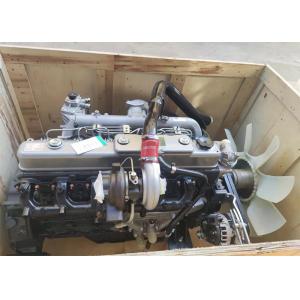
Add to Cart
6D34 Diesel Engine Assembly For Excavator SK200 - 6 SK230 - 6E Water Cooling
Specification
| Car name: Complete Engine |
| Model Number: 6D34 |
| Cylinder stroke: 105 |
| Application: Excavator |
| Cylinder diameter: 100 |
| valve: 12 valve |
| Cooling: Water cooling |
| Output: 114kw |
| Injection: Direction |
| Cylinders of number: 6 |
| Family: G30E76L5861062 |
Description
Which is the best definition of internal combustion engine?
Definition of 'internal combustion engine'. internal combustion engine. An internal combustion engine is an engine that creates its energy by burning fuel inside itself. Most cars have internal combustion engines.
4-Stroke-Engine
An internal combustion engine is an engine in which combustion, or the burning of fuel, occurs on the inside. There are many kinds but the term often means the machine that Niklaus Otto invented. In this kind, fire makes pressure increase inside a sealed box (cylinder). The pressure pushes a rod which is attached to a wheel. The rod pushes the wheel and makes it spin around. The spinning wheel is attached to other wheels, such as four car wheels, with a belt or a chain. The engine is very strong and can make all the wheels move.
Engines need oil to make them slippery or the moving parts would grind together and stick. Parts of a car engine are measured to 0.01 of a millimeter and some engine parts fit together very tightly.
Internal differs from external combustion where the fire is outside the engine, such as a steam engine.
Most road vehicles use the internal combustion engine today, and most of those use the four-stroke engine. Another type of internal combustion engine is the Wankel engine.
Gas turbines are internal combustion engines that work continuously, not by strokes. Rocket engines and guns are internal combustion engines but they do not turn wheels.
An internal combustion engine is an engine that creates its energy by burning fuel inside itself. Most cars have internal combustion engines.
A typical internal combustion engine harnesses only a quarter of the specific energy of gasoline.
We can reduce oil dependence by using alternatives to the gasoline-powered internal combustion engine, such as fuel-cell systems, which can derive hydrogen from natural gas.
In an internal combustion engine, the fuel is burned inside the engine rather than outside.

